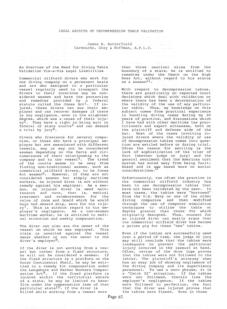UN conventions and national laws 1900 - 2014

This convention from the International Maritime
Organization (IMO), defines the notions of “territorial sea,
“exclusive economic zone”, and “continental shelf”, as
agreed by the signatory states in1982 and 2012.
Note that the International Maritime Organization (IMO) is
the branch of the United Nations in charge of the sea.

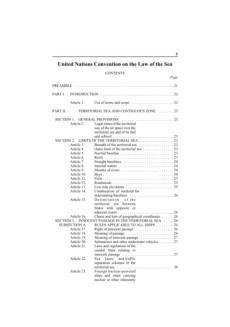

The 1995 amendments were adopted by resolution 1 of
the Conference of Parties to the International Convention
on Standards of Training, Certification, and Watch-
keeping for Seafarers (STCW Conference), which was
convened by the International Maritime
Organization and met at the Headquarters of the
Organization from 26 June to 7 July 1995. Resolution 1 is
Attachment 1 to the Final Act of the STCW Conference.
The STCW Conference, by resolution 2, also adopted
the Seafarers Training, Certification, and Watchkeeping
(STCW) Code (attachment 2 to the Final Act) and
resolutions 3 to 14 (attachment 3 to the Final Act). The
STCW Conference did not consider for amendment of the
articles of the 1978 STCW Convention.


These guidelines are those according to which hyperbaric
evacuation systems must be built.
Guidelines of associations such as IMCA or ADCI are
written according to this document.

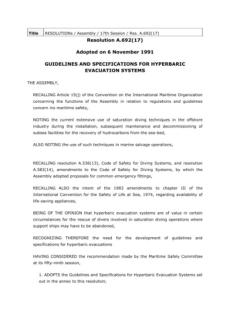

This resolution applies to vessels with dynamic positioning
system constructed between the 1st of July 1994 and the
ninth of June 2017.

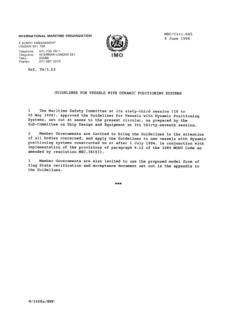
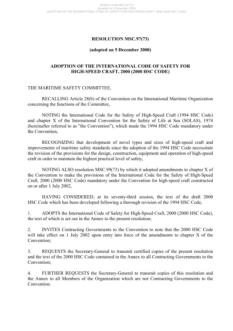

The maritime safety committee adopted the International
Code of Safety for High-Speed Craft (2000 HSC Code) on
the 5th of December 2000. It came in force on 1 July
2002.
Manufacturers, national and international safety
organizations are mandatory to apply the
recommendations of this code.
It can be downloaded by clicking on the picture of the
cover, and also from the website of the organization at
this address: http://www.imo.org/

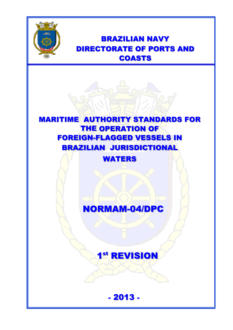

The purpose of this official document is to establish
administrative procedures for the operation of foreign-
flagged vessels in Brazilian jurisdictional waters, except for
those of sports and/or recreational use, aiming at the
safety of navigation, safeguard of human life, and
prevention of waterways environmental pollution.


This small PDF document, that can be downloaded,
provides the descrition of the International Maritime
Organization (IMO) instruments, and links to conventions,
resolutions, and maritime facts.
Note that the International Maritime Organization (IMO) is
the branch of the United Nations in charge of the sea.

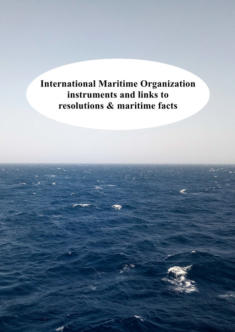

The International Convention for the Prevention of
Pollution from Ships (MARPOL) 1973 is the leading
international convention covering the prevention of
marine environment pollution by ships from operational or
accidental causes.

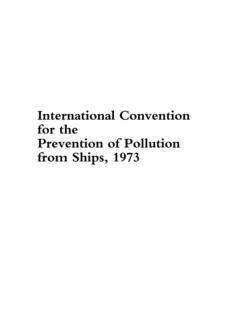

This document groups the initial documents of the
International Convention on Standards of Training,
Certification, and Watchkeeping for seafarers (STCW)
1978. Note that this convention has been amended in
1995 and 2010, and the amended material is not
contained within this document. However, the
amendments made in 2995 and 2010 are available
among the documents listed below.

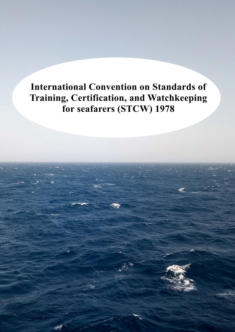

This document has been developed to provide a
minimum standard for the design, construction, and
survey of diving systems. These rules apply worldwide to
systems that have been certified more than 12 months
after the adoption of this code by the IMO Assembly.
Manufacturers, national and international safety
organizations are mandatory to apply the
recommendations of this code.
It can be downloaded by clicking on the picture of the
cover, and also from the website of the organization at
this address: http://www.imo.org/

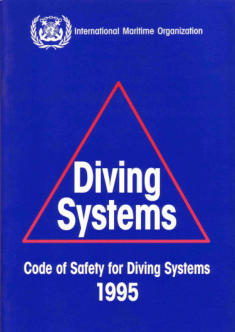
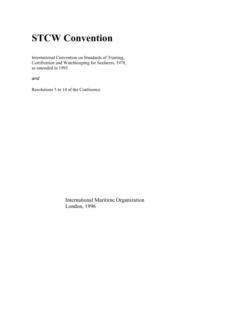

The 2010 amendments were adopted during the
conference held at the Philippine International Convention
Centre in Manila, from 21 to 25 June 2010.
This documents groups the texts STCW/CONF. 2/32,
STCW/CONF 2/33, and STCW/CONF. 2/34.

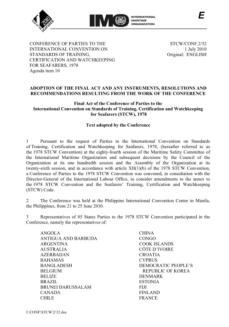

Adoption of the final act and any instruments,
recommendations, and resolutions resulting from the
work of the conference.
As a result of its deliberations, as recorded in the Record of
Decisions of the Plenary (BWM/CONF/RD/2/Rev.1) and
the Final Act of the Conference (BWM/CONF/37), the
Conference adopted the International Convention for the
Control and Management of Ships‘ Ballast Water and
Sediments, 2004.

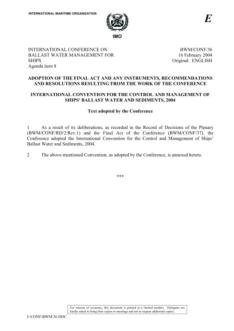

The Marine Environment Protection Committee, at its sixty-
fourth session (1 to 5 October 2012), approved the
Guidance for minimizing the transfer of invasive aquatic
species as biofouling (hull fouling) for recreational craft
(see MEPC 64/23, paragraph 11.8), developed by the Sub-
Committee on Bulk Liquids and Gases at its sixteenth
session (30 January to 3 February 2012), as set out in the
annex.
Member Governments are invited to bring the circular to
the attention of all parties concerned.


In the adoption of the International Convention for the
Control and Management of Ships' Ballast Water and
Sediments, 2004 (BWM Convention), Member States of
the International Maritime Organization (IMO) made a
clear commitment to minimizing the transfer of invasive
aquatic species by shipping. Studies have shown that
biofouling can also be a significant vector for the transfer
of invasive aquatic species. Biofouling on ships entering
the waters of States may result in the establishment of
invasive aquatic species, which may pose threats to
human, animal, and plant life, economic and cultural
activities, and the aquatic environment.

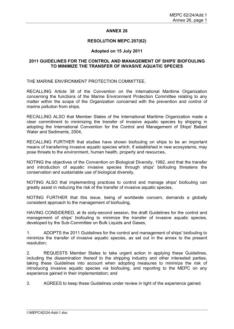
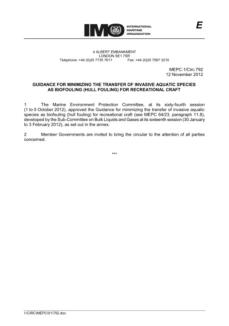

The Marine Environment Protection Committee, at its sixty-
fifth session (13 to 17 May 2013), approved the Guidance
for evaluating the 2011 Guidelines for the control and
management of ships' biofouling to minimize the transfer
of invasive aquatic species.
(see MEPC 65/22, paragraph 11.14), developed by the
Sub-Committee on Bulk Liquids and Gases at its
seventeenth session (4 to 8 February 2013), as set out in
the annex.
Member Governments are invited to bring the circular to
the attention of all parties concerned.

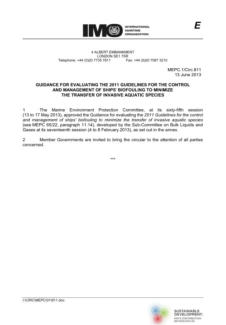

Introduction (IMO):
Invasive alien species (IAS) – species which may be
introduced into new ecosystems via intentional or
unintentional introductions – are a major threat to
biological diversity. In many cases, they can also have
devastating consequences for human health, agricultural
productivity, and trade. The economic cost of IAS is
estimated at hundreds of billions of dollars annually to
economies worldwide.
Increasing travel, trade, and tourism have facilitated
intentional and unintentional movement of species
beyond natural geographical barriers. Many of these alien
species have become invasive. Trade is one of the main
pathways through which IAS can be introduced.
Intentional introductions of IAS can occur through trade in
new plant species and animals, while unintentional
introductions are often linked to trade in agricultural
commodities, as well as transportation and shipping.
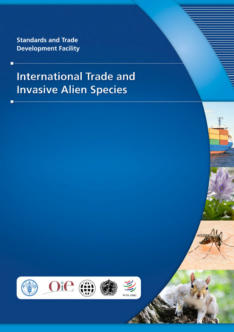

The Marine Environment Protection Committee, at its sixty-
fifth session (13 to 17 May 2013), approved the Guidance
for evaluating the 2011 Guidelines for the control and
management of ships' biofouling to minimize the transfer
of invasive aquatic species.
(see MEPC 65/22, paragraph 11.14), developed by the
Sub-Committee on Bulk Liquids and Gases at its
seventeenth session (4 to 8 February 2013), as set out in
the annex.
Member Governments are invited to bring the circular to
the attention of all parties concerned.

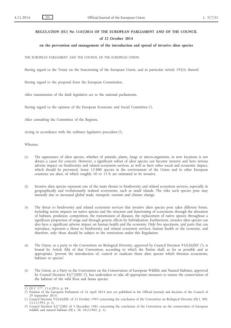


The guidelines for the Authorization of Organizations
Acting on behalf of the Administration is the document
that sets the conditions under which classification societies
can undertake the classification of vessels and diving
systems.
The reference of the document is A 18/res.739

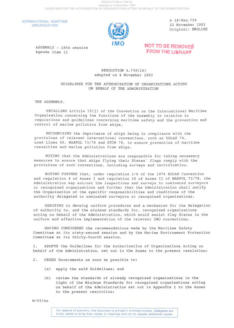

This document contains minimum specifications for
organizations recognized as capable of performing
statutory work on behalf of a flag State Administration in
terms of certification and survey functions connected with
the issuance of international certificates.

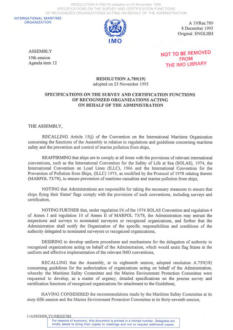

Safety Management System (ISM) means a structured and
documented system enabling Company personnel to
implement effectively the Company safety and
environmental protection policy.

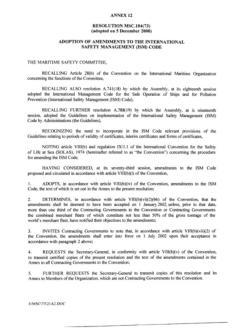


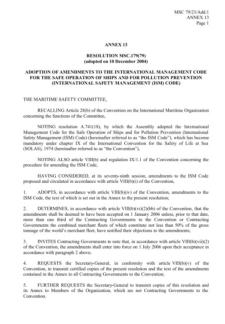

This text is an amendment of the International Convention
for the Prevention of Pollution from Ships (MARPOL) 1973

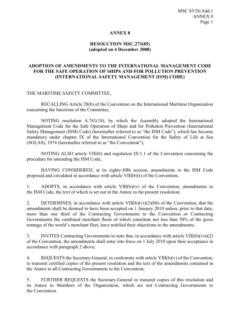

This text is an amendment of the International Convention
for the Prevention of Pollution from Ships (MARPOL) 1973



The aim of this international convention is the prevention
of accidents and injury to health arising out of, linked with
or occurring in the course of work, by minimizing, so far
as is reasonably practicable, the causes of hazards
inherent in the working environment.
This document is to be considered the minimum
requirement of a health and safety policy.

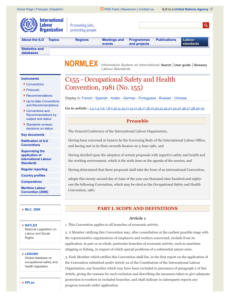

The association of Southeast Asian Nations (ASEAN) was
established on 8 august 1967
This document is the charter that links its members.
To be read by people and companies who want to work
in the SE Asia

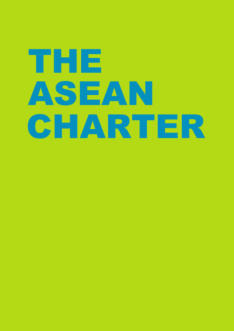

IMO is responsible for some 50 international treaties and
literally hundreds of other legal instruments, yet does not
(with one exception) have the power to ensure their
effective implementation. Enforcement depends on States
which, generally, have to incorporate IMO measures into
their domestic law. However, in the 1980s, many
Governments in the developing world were having
difficulty in this respect, due to a lack of appropriate legal
expertise at the national level. It was to address this
problem that IMLI – the IMO International Maritime Law
Institute – was established. Its main purpose was, and
remains, to train lawyers, principally from developing
countries, in private and public international maritime law.

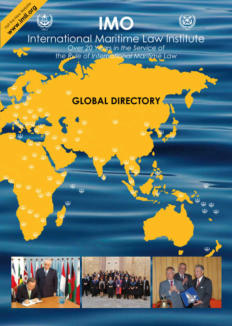

This study presents a comparative analysis of labour laws
and other related labour and social legislations pertaining
to the employment of three specific groups of workers –
women, youth or young people, and
persons with disabilities – and industrial relations, in
particular social dialogue, among the 10 Member States of
the Association of Southeast Asian Nations (ASEAN), using
conventions of the International Labour Organization
(ILO), the United Nations (UN), and other similar
international bodies.

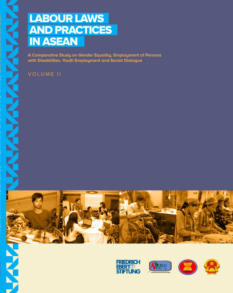

The International Labour Organization (ILO) estimates that
occupational accidents and work-related diseases cause
over 2.3 million fatalities annually, of which over 350,000
are caused by occupational accidents and close to 2
million by work-related diseases. As a result, approximately
6,300 people die every day due to these causes:
occupational accidents kill nearly a 1,000 people every day
and work-related diseases provoke the death of almost
5,400 more individuals. There were also over 313 million
non-fatal occupational accidents (requiring at least four
days of absence from work) in 2010, meaning that around
the world work provokes injury for approximately 860,000
people every day.
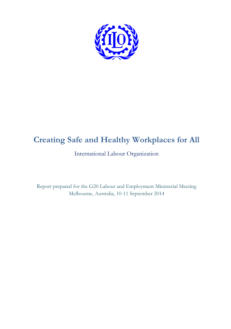

Convention on the International Maritime regarding
establishing international standards of safety for the
design, construction, equipment of and unified survey
requirements for diving systems.

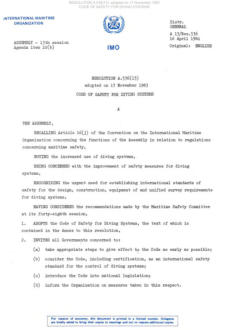

The tests, examinations and inspections indicated in this
Register are based on the requirements of the ILO
Convention No. 152 and recommendation No. 160. They
are intended to ensure that ships’ lifting appliances are
initially certified by a competent person and to establish
periodically that they continue to be in safe working order
to the satisfaction of a competent person acceptable to
the competent authority.






Click on the
octopus to return to
the top of the page

Publisher: International Labour Office
The International Labour Organization (ILO), a subsidiary
of the United Nations, features a tripartite structure
encompassing governments, employers' associations, and
workers' organizations. This guide explores the distinct
rights and obligations of these groups within the ILO to
guarantee that global labour standards are effectively
maintained.



Publisher: International Labour Organization
The International Labour Organization's guidelines on
employment policy establish a structure for formulating
and executing said policies, ultimately guaranteeing
optimal opportunities to access the requisite positions
necessary to achieve satisfactory labour conditions.

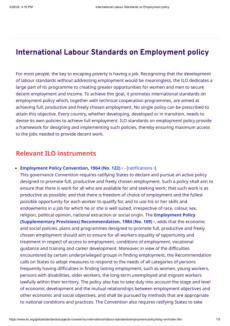

The International Safety Management Code (ISM Code),
adopted by the International Maritime Organization (IMO)
through Assembly Resolution A.741(18) in 1993, serves as
a critical framework for the safe operation of ships and
pollution prevention. The Code entered into force on July
1, 1998, following amendments to the International
Convention for the Safety of Life at Sea (SOLAS) that
introduced Chapter IX, which specifically addresses
management for the safe operation of ships.

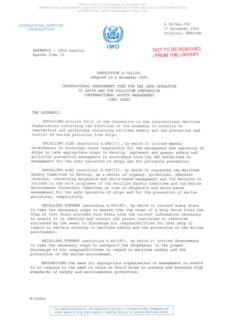

Electromagnetic Compatibility (EMC) is a critical aspect of
maritime safety and functionality, particularly for electrical
and electronic equipment on ships. The International
Maritime Organization (IMO) has established guidelines
under Resolution A.813(19), which outlines the general
requirements for EMC in all electrical and electronic ship
equipment.

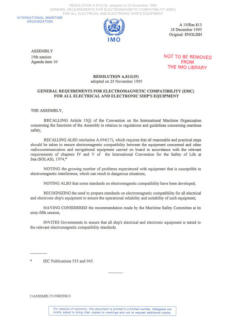

The IMO Guidelines on anchoring systems for MODUs
(MSC/Circ.737) provide recommendations for the design,
operation and maintenance of anchoring systems used as
the sole means of position keeping for mobile offshore
drilling units (MODUs).

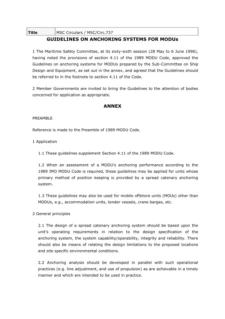

The International Life-Saving Appliance (LSA) Code,
adopted by the Maritime Safety Committee (MSC) through
resolution MSC.48(66) on June 4, 1996, establishes
international standards for life-saving appliances on ships.
This code is integral to ensuring safety at sea, particularly
under the International Convention for the Safety of Life at
Sea (SOLAS).
(also see Amendements to LSA code - MSC.218(82))

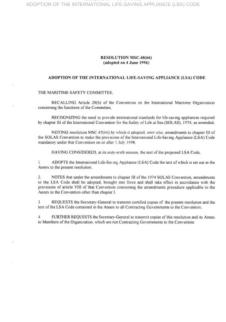

The International Convention for the Safety of Life at Sea
(SOLAS) is a critical international treaty aimed at ensuring
maritime safety. The 2004 edition is a consolidated version
that incorporates various amendments and protocols
since its initial adoption
(resolution MSC.474(102) to be added)

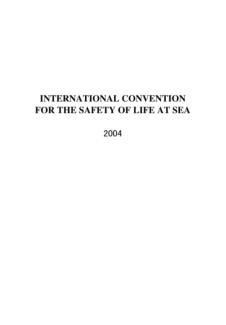

These guidelines are intended to enhance the safety of
offshore supply vessels (OSVs) and their personnel by
establishing standards that align with the International
Convention for the Safety of Life at Sea (SOLAS) and the
Code on Intact Stability for all Types of Ships Covered by
IMO Instruments (IS Code).

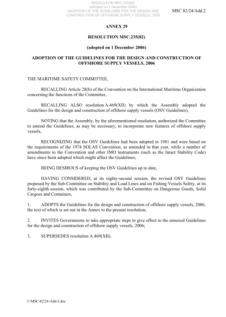

The International Life-Saving Appliance (LSA) Code was
amended by Resolution MSC.218(82), adopted on
December 8, 2006, and these amendments entered into
force on July 1, 2008. This resolution is part of the
ongoing efforts by the International Maritime
Organization (IMO) to enhance maritime safety standards.

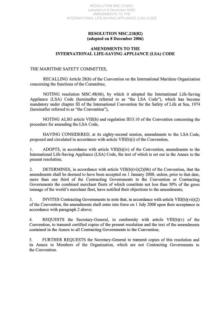

The Code of Safety for Special Purpose Ships, 2008,
adopted through Resolution MSC.266(84) at the 84th
session of the Maritime Safety Committee on May 13,
2008, establishes safety standards specifically tailored for
special purpose ships. This code serves as an amendment
to the earlier SPS Code adopted by resolution A.534(13).

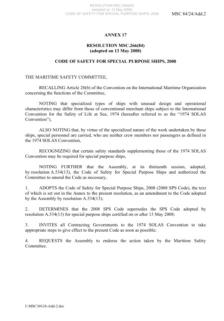

The 2009 MODU Code, formally known as the Code for
the Construction and Equipment of Mobile Offshore
Drilling Units, was established to provide international
standards for mobile offshore drilling units (MODUs)
constructed on or after January 1, 2012. This code is
crucial for ensuring safety and facilitating the international
movement and operation of these units.



The International Code for Application of Fire Test
Procedures (FTP Code) was adopted by the International
Maritime Organization (IMO) through Resolution
MSC.307(88) on December 3, 2010. This code is a
comprehensive framework designed to standardize fire
testing procedures for materials and products used in
maritime applications, ensuring safety and compliance
with international standards.

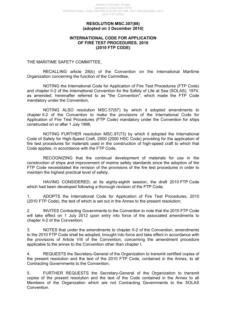




This information note published by the UK HSE in January
2013 regarding changes in the implementation of the
Health and Safety at Work Act 1974 (Application outside
Great Britain) provides an overview of the changes and
updates that the new Order introduces, including the
revocation of previous orders, the re-enactment of
provisions with modifications, and the introduction of new
regulations related to emerging energy technologies and
climate change technologies. The note also seeks to clarify
the Health and Safety Executive's (HSE) legal authority in
regulating these activities and to update definitions based
on operational experience and public feedback.

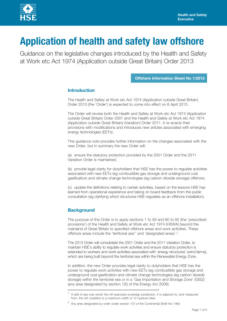



4 - UK - Health and Safety at Work etc. Act 1974
Author: The UK’s government
The Health and Safety at Work etc Act 1974 is the primary
legislation governing workplace health and safety in
Great Britain. It establishes a legal framework to protect
the wellbeing of employees, contractors, and the general
public from risks associated with work activities. It aims to
ensure workplaces are safe, healthy, and secure.
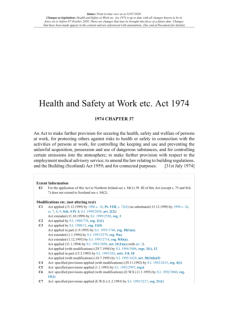
Author: James R Sutterfield
James R. Sutterfield’s legal analysis highlights that
decompression table validation is not just a technical issue,
but also a legal responsibility with significant liabilities for
those who neglect to verify and validate the procedures
they require others to follow. Employers in diving and
compressed air work must ensure comprehensively that
their decompression practices are both current and
defensible—scientifically, ethically, and in the courtroom


9 - Legal aspects of decompression table validation
